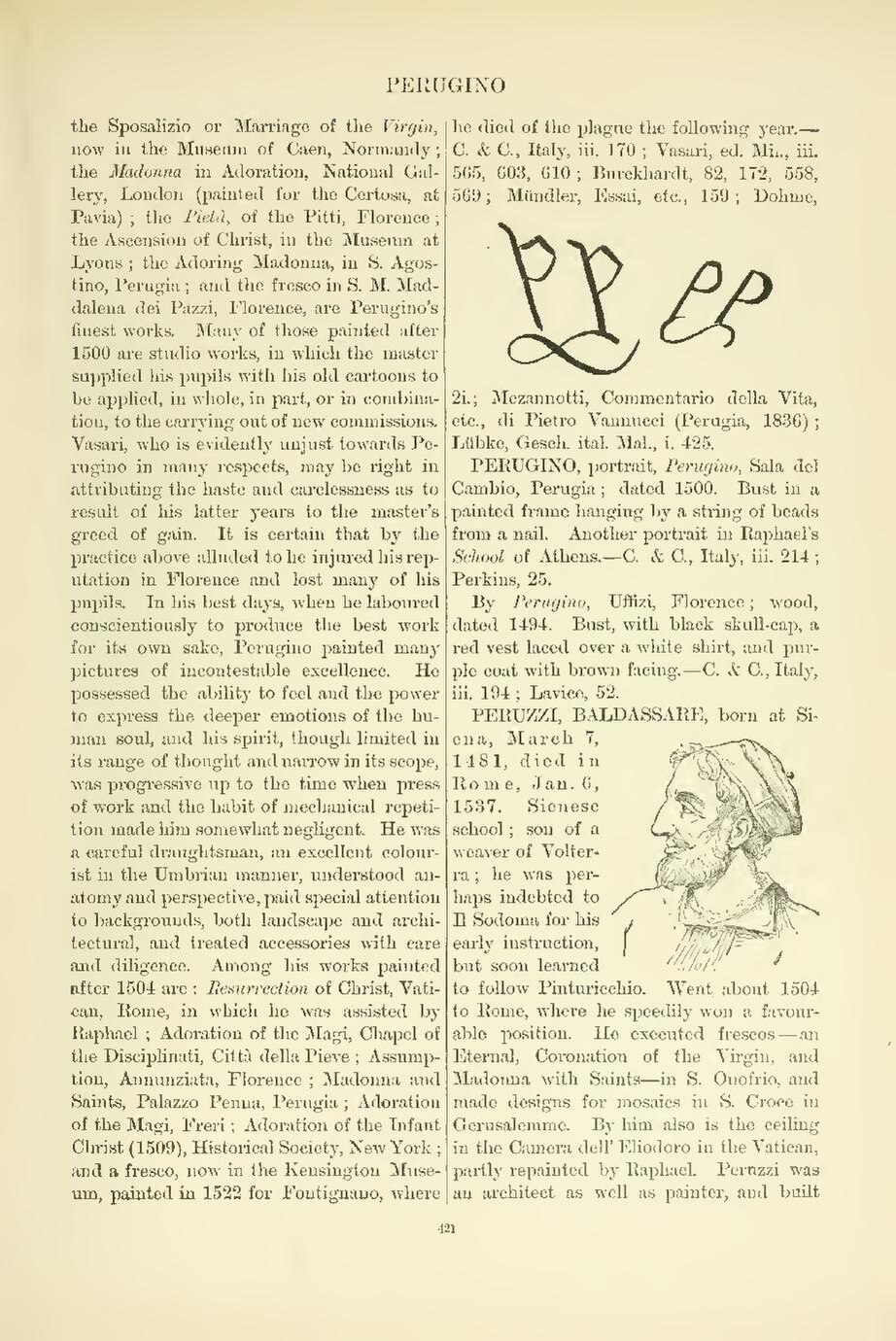the Sposalizio or Marriage of the Virgin, now in the Museum of Caen, Normandy; the Madonna in Adoration, National Gallery, London (painted for the Certosa, at Pavia); the Pietà, of the Pitti, Florence; the Ascension of Christ, in the Museum at Lyons; the Adoring Madonna, in S. Agostino, Perugia; and the fresco in S. M. Maddalena dei Pazzi, Florence, are Perugino's finest works. Many of those painted after 1500 are studio works, in which the master supplied his pupils with his old cartoons to be applied, in whole, in part, or in combination, to the carrying out of new commissions. Vasari, who is evidently unjust towards Perugino in many respects, may be right in attributing the haste and carelessness as to result of his latter years to the master's greed of gain. It is certain that by the practice above alluded to he injured his reputation in Florence and lost many of his pupils. In his best days, when he laboured conscientiously to produce the best work for its own sake, Perugino painted many pictures of incontestable excellence. He possessed the ability to feel and the power to express the deeper emotions of the human soul, and his spirit, though limited in its range of thought and narrow in its scope, was progressive up to the time when press of work and the habit of mechanical repetition made him somewhat negligent. He was a careful draughtsman, an excellent colourist in the Umbrian manner, understood anatomy and perspective, paid special attention to backgrounds, both landscape and architectural, and treated accessories with care and diligence. Among his works painted after 1504 are: Resurrection of Christ, Vatican, Rome, in which he was assisted by Raphael; Adoration of the Magi, Chapel of the Disciplinati, Città della Pieve; Assumption, Annunziata, Florence; Madonna and Saints, Palazzo Penna, Perugia; Adoration of the Magi, Freri; Adoration of the Infant Christ (1509), Historical Society, New York; and a fresco, now in the Kensington Museum, painted in 1522 for Fontignano, where he died of the plague the following year.—C. & C., Italy, iii. 170; Vasari, ed. Mil., iii. 565, 603, 610; Burckhardt, 82, 172, 558, 569; Mündler, Essai, etc., 159; Dohme, 2i.; Mezannotti, Commentario della Vita, etc., di Pietro Vannucci (Perugia, 1836); Lübke, Gesch. ital. Mal., i. 425.
An image should appear at this position in the text. To use the entire page scan as a placeholder, edit this page and replace "{{missing image}}" with "{{raw image|Cyclopedia of painters and paintings (IA cyclopediaofpain03cham).pdf/443}}". Otherwise, if you are able to provide the image then please do so. For guidance, see Wikisource:Image guidelines and Help:Adding images. |
PERUGINO, portrait, Perugino, Sala del Cambio, Perugia; dated 1500. Bust in a painted frame hanging by a string of beads from a nail. Another portrait in Raphael's School of Athens.—C. & C., Italy, iii. 214; Perkins, 25.
By Perugino, Uffizi, Florence; wood, dated 1494. Bust, with black skull-cap, a red vest laced over a white shirt, and purple coat with brown facing.—C. & C., Italy, iii. 194; Lavice, 52.
An image should appear at this position in the text. To use the entire page scan as a placeholder, edit this page and replace "{{missing image}}" with "{{raw image|Cyclopedia of painters and paintings (IA cyclopediaofpain03cham).pdf/443}}". Otherwise, if you are able to provide the image then please do so. For guidance, see Wikisource:Image guidelines and Help:Adding images. |
PERUZZI, BALDASSARE, born at Siena,
March 7,
1481, died in
Rome, Jan. 6,
1537. Sienese
school; son of a
weaver of Volterra;
he was perhaps
indebted to
Il Sodoma for his
early instruction,
but soon learned
to follow Pinturicchio. Went about 1504
to Rome, where he speedily won a favourable
position. He executed frescos—an
Eternal, Coronation of the Virgin, and
Madonna with Saints—in S. Onofrio, and
made designs for mosaics in S. Croce in
Gerusalemme. By him also is the ceiling
in the Camera dell' Eliodoro in the Vatican,
partly repainted by Raphael. Peruzzi was
an architect as well as painter, and built
